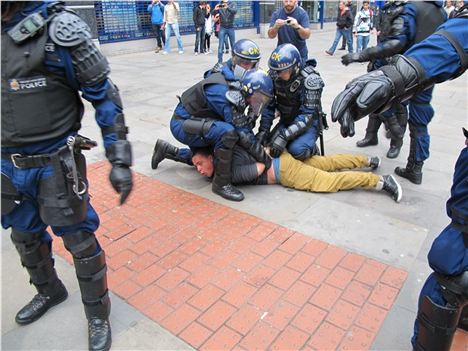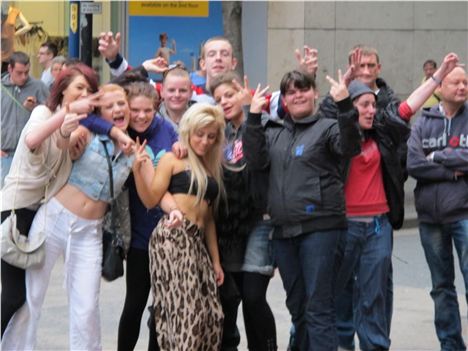'IT's like kids are in the ultimate disco here. It's a massive distortion of what's normal into something utterly different.' This was ManCon’s live take on the Manchester edition of the August riots.
Following the widespread August mayhem, The Guardian newspaper and the London School of Economics embarked on a collaborative research study 'Reading the Riots'.
With phase one completed, it's now time to take the initial findings out to the areas affected. The Manchester edition of 'Community Conversations' took place on Wednesday at the Friends’ Meeting House, where a varied local panel led the discussion into causes and response.
Many accused Society, exemplified by bankers and politicians, of hypocrisy. Many felt they had no hope for the future, and no voice. A number mentioned the police shooting of Mark Duggan as a factor, even in Manchester.
The initial research, as we heard from Manchester researcher, Mags Casey, involved interviews with rioters, conducted at some distance from events.
Distinct threads emerge: rioters came disproportionately from disadvantaged communities, those suffering high unemployment, low income levels and poor educational attainment.
Many accused Society, exemplified by bankers and politicians, of hypocrisy. Many felt they had no hope for the future, and no voice. A number mentioned the police shooting of Mark Duggan as a factor, even in Manchester.
Farida Anderson, CEO of Partners of Prisoners, and Ruth Ibegbuna, from local charity RECLAIM, know those communities and are fearful of riots returning, and wants policy changes to make a difference.
Councillor Pat Karney spoke of what ordinary Mancunians experienced, shoppers terrified inside the locked doors of Marks and Spencers or commuters locked in a marooned tram as they watched the riots begin, and saw the rioters filming their fear, not knowing whether they themselves were to be targets.
Representing the police view, Chief Superintendent Russ Jackson, quoted the force’s own statistics, making clear the scale of the demands placed on the service and the evidence that a large percentage of those prosecuted had previous convictions.
Different interpretations can be put on the same evidence. Many rioters voiced a hatred of the police. Is this because of overbearing police behaviour or is it, as Russ Jackson implied, really because they’re criminals, a group of people who automatically dislike the police as part of their career plan?
Fairly and firmly chaired by Amnina Lone, co-director of SARF (Social Action & Research Foundation), the organisers of the evening, the public response was varied. Certainly some came with a pre-determined agenda and pre-determined views, but a wider constituency was present to listen and reflect.
Universal agreement was reached that for many young people it was all very exciting.
They saw it on the TV and knew they 'had to be there': it was an unmissable event. It was fun.
A comment on irony of selling 'I love MCR' hoodies drew laughter.
There was uncertainty about how accurately the views expressed during researchers interviews reflected participants’ motivations at the time of the riots.
Surely, one questioner asked, it was highly likely that participants had rationalised their behaviour after the event, coming up with reasons they could attempt to explain to others and almost searching for justification.
The interviews have been recorded and subjected to a rigorous analysis. Though 270 rioters agreed to be interviewed, I wonder how many declined.
I know it’s at least three times as many. Do those who declined have different views? Are those interviewed more convinced than the others that they could justify their behaviour? And what of those who did not riot, those thousands of young people who feel they have little hope who just stayed at home?
SARF, who organised the Manchester conversation, is to interview them. Good. Their voices will be heard.
Cllr Karney represents Harpurhey, often identified as an area with high scores on indices of deprivation. He spoke of the juxtaposition of connectivity and disconnection; the young rioters connected to the world via their smart phones, filming the fear of their own communities from whom they are apparently debarred.
This research sprang from the refusal of the government to establish a public inquiry into the riots.
David Cameron put them down to “criminality, pure and simple”. London School of Economics whose motto, 'rerum cognoscere causas', means to know the causes of things, decided to find out if this were true.
Phase one of the research has reached a maturity stage and the research will move on to look at policing and sentencing before studying the communities affected.












